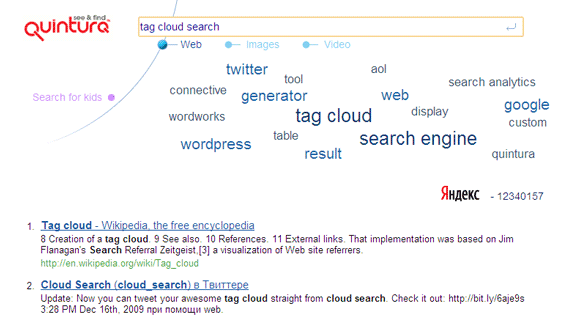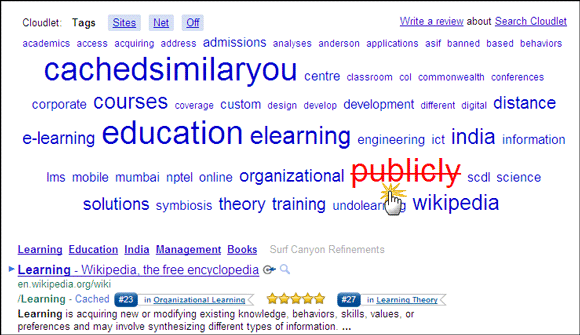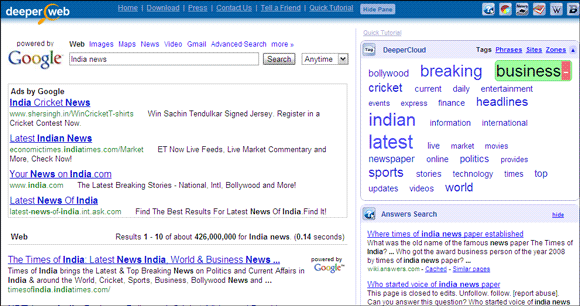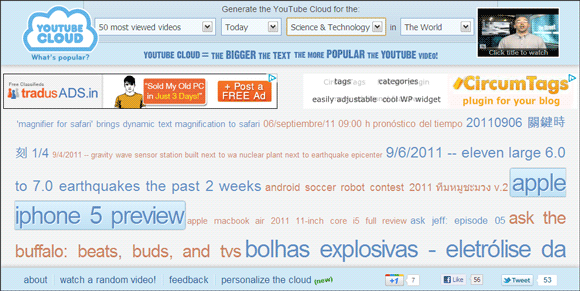Quite a few blogs and websites have them. Tag clouds are one of the simplest visualization tools available that can enhance access to buried articles on your website. It is quite simple to do really, as it is just a visual – seemingly haphazard – display of the tags on a website. It’s just that the importance of each is shown by size and/or color.
Tag clouds became a default of many blogs and were as common as fleas on a dog’s back, till their relative importance declined somewhat. But tag clouds still offer a different way to search because it is so visual and quick. The eye prefers to pan and scan rather than go vertically or horizontally in search of information. So, some web services have continued to take the help of tag clouds. Here are six web services that help you look for content using tag clouds.
Quintura
The search engine touts the advantages of ‘visual find’. The search engine with a tag cloud feature does work for me because along with the linear list of results it gives me a tag loud of related keywords. A mouse-over the related keywords gives me a preview of the search results I can expect if I do a search with that. Quintura’s tag based search works because if you are searching for something without a definite idea, the related keywords help out to broaden your options. Quintura also gives you a free web search client. The 4.4 MB free search software helps you to search the web using a selected search engine. We have mentioned Quintura before when we talked about The Top 5 Google Alternatives and Why You Should Use Them.
Search Cloudlet (Firefox) [No Longer Available]
The search add-on for Firefox inserts smart tag clouds into Google, Yahoo, and Twitter interface to help you search faster. Search Cloudlet seamlessly inserts a tag cloud as you conduct your usual search. As you can see in the screenshot, it helps you to scan and read the tags instead of drilling down through the list of search results. You can also remove keywords highlighting it in red with a mouse-over and clicking on the word. Search Cloudlet however did not work for me on Twitter search as intended. The add-on is not perfect, but it’s still worth keeping for what the tag cloud enabler gives you.
If you want to catch what’s trending on Twitter with the help of a tag cloud, try Twitscoop instead.
Deeperweb.com
Deeperweb again helps you improve your Google search results with a tag cloud. It also comes with a Firefox add-on [No Longer Available]. Deeperweb allows you to again extend your search by giving you relevant keywords in the tag cloud. You can fine tune the search by removing none-essential keywords. Get the complete Deeperweb experience as it has lots more to offer beyond the standard Google search.
SenseBot
Sensebot is not pretty to look at but it does bring out relevant key phrases from the search results as it summarizes search results for you. The semantic search engine also summarizes news searches. You can customize the summary by choosing to leave out few of the links. Sensebot gives you the choice of using Google, Yahoo, and Bing along with its own semantic search engine to conduct the search.
YouTube Cloud
Searching through thousands of videos is a mean feat. YouTube does have a good search but the third-party YouTube tag cloud gives you something more to work with. You can quickly filter YouTube videos to catch the most viewed, most trending, or the most popular ones. You can also use the dropdowns to select videos using a time frame, categories, and country. The tag cloud then makes it a cinch as you just have to select the bigger words to get to the best YouTube video among the rest (any surprises that it’s a video for an iPhone 5 preview). You can also personalize YouTube Cloud to display the tag cloud your way.
Tag clouds won’t always give you the right result you are looking for. But compared to the list like display of search results, it gives you a more sweeping picture of what’s available. It highlight’s the important and combined with a traditional approach to search might help you to get rid of the fluff on the search page.
We have featured many search engines and the ways they use to search the web. Have you tried the tag approach? Do you think it gives you a better glimpse into your searches?
Image Credit: Wikimedia Commons






